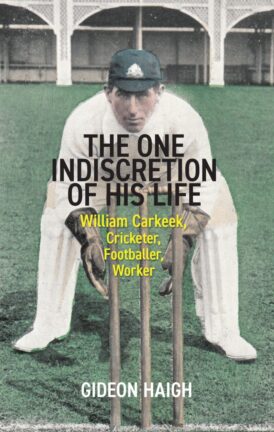The One Indiscretion Of His Life
Martin Chandler |Published: 2024
Pages: 192
Author: Haigh, Gideon
Publisher: Archives Liberation Front
Rating: 4.5 stars

It is certainly an intriguing title for a man’s life story and, given Gideon Haigh’s pre-eminence as a biographer, was enough to raise my expectations of this one when, not very long ago, I first learnt that it was on its way.
Inevitably curiosity got the better of me and, rather than just wait for my copy of the book to be delivered from Australia*, I decided to try and found out what it might have been that William ‘Barlow’ Carkeek had done. Such quests are always easier with the benefit of hindsight, and in the end I did have to wait for the book to arrive before I was able to discover what Carkeek’s transgression was.
In cricketing terms Carkeek, a wicketkeeper, isn’t an obvious choice for a biography. He toured England in 1909 as understudy to Hanson Carter and three years later, in Carter’s absence, played in all six Tests in the 1912 Triangular Tournament. Six catches and a batting average 5.33 are not statistics that set the pulse raising.
Outside those Test appearances it is clear that Carkeek, in Australia if not in England or North America, was a decent enough cricketer, and he was also a successful Aussie Rules player, but a man who acquired his nickname from the famously dour English batsman Dick Barlow was never going to be a performer in the Adam Gilchrist mould.
But even if Carkeek had been a Gilchrist, or a Jack Blackham, Carter or James Kelly he still wouldn’t have found favour with selector Clem Hiil, whose objections to his selection for Australia were not cricketing ones, and instead were based on Carkeek’s actions as a man.
Carkeek was a working man, who was as blue collar as they come, his occupations outside the game being variously described as riveter, boilermaker and metal polisher. But that in itself was not the cause for Hill’s disquiet. The indiscretion that the book’s title refers to arises out of Carkeek’s dalliance and cohabitation with a married woman in an era where social mores were very different from those of today.
Another important feature of the game in Carkeek’s time was the battle for control of the running of Australian cricket between the administrators and the leading players, and more particularly those who were cut from much the same cloth as England’s leading amateurs.
There was no real role for Carkeek in the drama that peaked with the infamous fist fight that occurred between Clem Hill and Peter McAlister. Essentially Carkeek simply did as was asked of him by the Board, but the whole dispute is a central theme in really understanding Carkeek’s story, and Haigh has done his readers a great service by exploring and recounting that tale succinctly and with a clarity that few previous writers have brought to a complex as well as important subject.
The Great War brought Carkeek’s sporting life to a halt. Aged 35 when the conflict began Carkeek, who was to marry in 1915, did not take part in the war to end all wars and concentrated on providing for his family. That wasn’t always straightforward as illness affected his later years with, on more than one occasion, his old cricketing friends needing to provide financial assistance. Carkeek’s health did improve, but he was still only 58 when he died in 1937, of injuries sustained whilst, as a pedestrian, he was struck by a car.
Which all makes for an interesting story if not, necessarily, a gripping one. But don’t be fooled by my brief summary. In fact by dint of detailed research, the knowledge of the era gained whilst working on other projects and the assistance of Carkeek’s grandson Haigh has produced a fascinating biography that is right up there with his best work.
And that should be praise enough to persuade anyone with an interest in cricket literature to go out and acquire* a copy of The One Indiscretion of his Life, given that there are as many as 52 earlier books listed in the bibliography on Haigh’s website. Not all are about cricket, but the majority are so on the basis of the famous observation of CLR James, what do they know of cricket that only cricket know, those non-cricketing titles are probably something we should be grateful for.
*I regret that I know of no means of obtaining a copy of the book in England, at the present time at least. The only emporia that stock it that I am aware of are the author’s own website, and Australia’s two specialist dealers, Roger Page and Ken Piesse.






Leave a comment